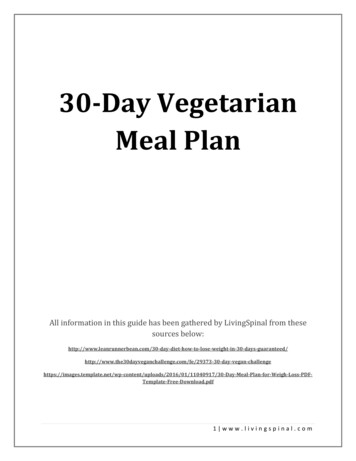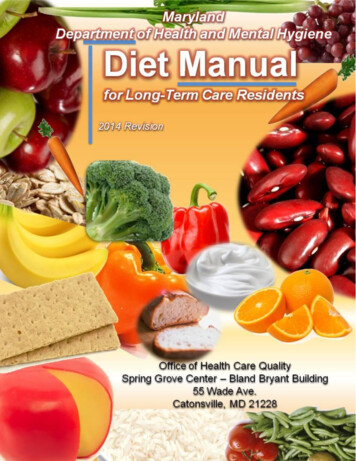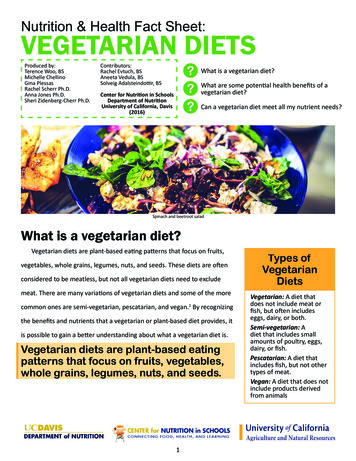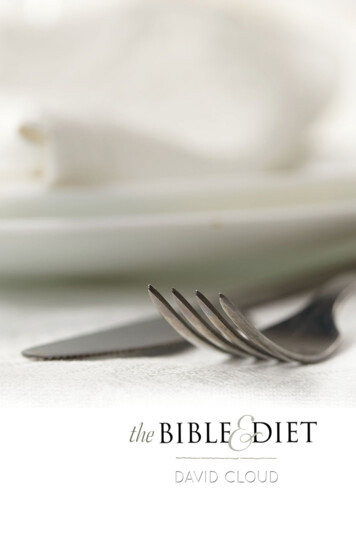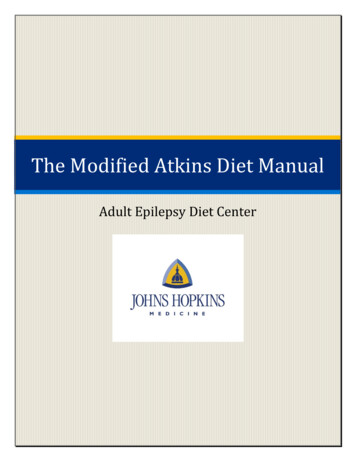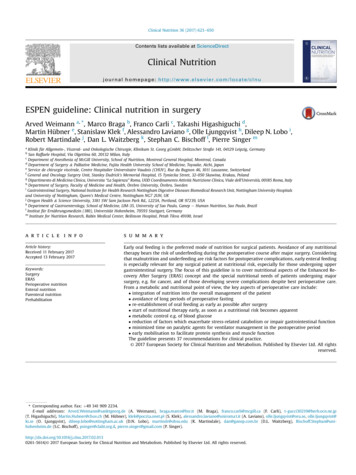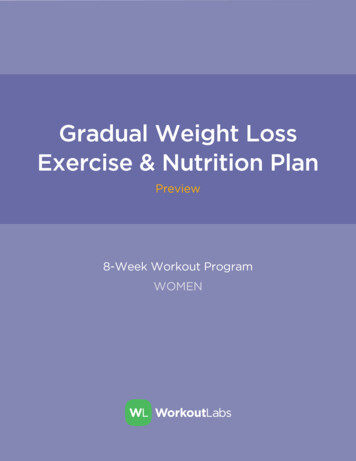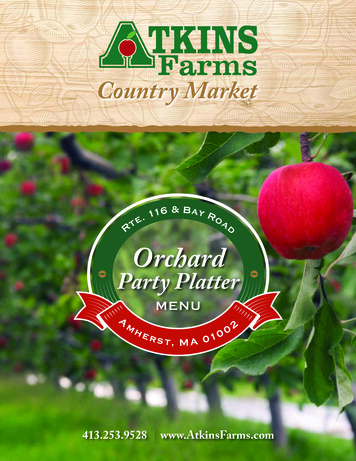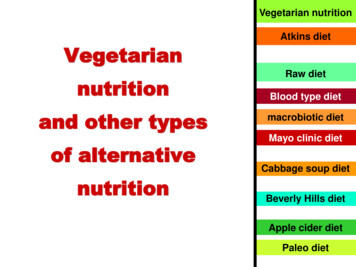
Transcription
Vegetarian nutritionVegetariannutritionand other typesof alternativenutritionAtkins dietRaw dietBlood type dietmacrobiotic dietMayo clinic dietCabbage soup dietBeverly Hills dietApple cider dietPaleo diet
followers of alternative diets do not fully agreewith the conventional healthy dietrecommendations and do not consider themoptimal for health. they suggest alternative forms of nutrition (oftenreffered to as „diets“), that they consider to behealthier (paleo diet, raw diet, etc.)Vegetarian nutritionAtkins dietRaw dietBlood type dietmacrobiotic dietI switched tovegetariannutrition. Isn tit great,doctor?Mayo clinic dietCabbage soup dietBeverly Hills dietApple cider dietPaleo diet
Healthy diet-supplies all nutrients in adequate quantity of nutrientsrequired for- growth and maintenance of the body- body functions-eating a variety of foods – the best way howto get all nutrients in sufficient amounts-any limitation in diet increases the risk ofinsufficient intake of nutrients
Vegetarian diet vegetarians exclude foods of animal origin from their diet: their diet is based on foods of plant origin- about 5% of population in developed countries (Europe, USA) are vegetariansDo not eat - avoidMeat and meat productsInner organs (liver)Milk and milk productsEggsFish - someGelatineLardBee honeyDo eatCerealsLegumesVegetablesFruitAlgae - seaweedPlant oilsNuts
Types of vegetariandietDo not consumeConsumesemi-vegetariansred meatwhite meat, fish, eggs, milk anddairy products, cheeselacto – ovo –vegetariansall types of meatmilk, dairy products, cheese, eggslacto – vegetariansmeat and eggsmilk, dairy products, cheeseovo – vegetariansmeat, milk, dairy products,cheeseeggsvegansall foods of animal originonly foods of plant originvitariansall foods of animal origin,cooked foodonly plant foods, raw- about 5% of population in developed countries (Europe, USA) are vegetarians
Why do the people become vegetarians?health concerns - disease preventionGood reason- statistical data show that vegetarians are at lower risk of- obesity- diabetes- cancer- elevated blood cholesterol level- hypertension- cardiovascular diseasesthey consider animal foods to be harmful, e.g.- milk causes adverse reaction to the body- meat contains harmful substances, etc.this is not supported by scientific evidence and serious studiesmoral and ethical beliefs- to protect the animals and environmentreligious reasons- e.g. the seventh day adventists church, buddhists
An example of a vegetarian menu:breakfastnothingmid-morning snack:coca-cola 0,5llunch:instant soup, chips with mayonnaise, tea 4 spoons of sugar, chocolate100 gafternoon snack:chips 7 UP 0,5ldinner:pasta, catchup, Sprite 0,5 l, crackers croissant with chocolate is it healthy ?-no breakfastno fruit and vegetableswhite cerealsa lot of sweetsa lot of salta lot of soft and sweetened drinks diet without animal foods is not necessarily healthy in vegetarian nutrition is also necessary to keep the rules of „healthyvegetarian nutrition“ and to eat foods with high nutritional value
.what are the positives of animal foods? animal foods – are rich in some nutrients meat – iron, proteins, vitamins (B12) milk – calcium, protein, vitamins (B12, D) eggs – proteins, vitamins, minerals plant foods – do not contain some nutrients at all (vitamin D, B12) absorption of minerals from plant foods is lower than from animal foods– organic acids present in plant food bind minerals tightly and decrease absorption– higer intake of dietary fibre – faster motility – lower absorption plant protein - lower nutritional value- lower content of essential amino acids not all plant foods are rich in nutrients and healthy (croissants, soft drinks)!!! avoidance of animal foods – increases the risk of nutrient deficiency
Nutrients that may be deficient in a (imbalanced) vegetarian diet: iron protein vitamin D calcium zinc vitamin B12 vegetarian diets are usually lower in energyIf somebody has decided for a vegetarian diet, he/she shouldstep A/ to exclude/reduce animal foodsstep B/ include adequate amounts of plant sources of the nutrients thatmay be deficient- a healthy vegetarian diet must be well planned – the vegetarian needs toknow which foods provide the potentially deficient nutrientse.g.calcium – soy, vegetables, legumesiron – soy products, vegetables, legumesprotein – soy products, cereals, legumesvitamin B12 – supplements, fortified foods, etc.
Imbalanced vegetarian diet can cause of health disorders: anaemia – deficiency of Fe, vitamin B12 a protein children – growth retardation babies of vegetarian mothers – serious neurological disorders menstrual cycle disorders, reproduction problems infectious diseases (e.g. infectious hepatitis) – pathogenicmicroorganisms may be present in raw foods (e.g. sprouts) risk of osteoporosis
My . child. wants to be a vegetarian.- Teenager- Granpa/grandma- Pregnant woman- Lactating mother- Cancer patient.Is it a good idea?
The risk of inadequate nutrient intake is higher in– strict vegetarians, who do not consume any animal food(vegans, vitarians)– in population groups with higher nutritional requirements children and adolescentspregnant and lactating femalesthe elderlypatients– for these people vegetarian diet (especially strict forms)is not recommended– if they decide for vegetarian type of diet, their diet mustbe planned very carefully, so that it contains sufficientquantity of all nutrients and meets the dietaryrequirements
A well balanced vegetarian diet has a better nutrient composition and thus also positive health effects les nutrition-related diseases has been observed in vegetarians :- obesity- high blood cholesterol levels- diabetes- hypertension- cancer- cardiovascular diseasesThe same positive health effect can be achieved also by a well-balancednon – vegetarian nutrition.Vegetarians have also generally healthier lifestyle- regular physical activity- lower consumption of alcoholic beverages- less smokersKeep in mind: Vegetarian diet has also its rules
Other types of alternative nutrition – „fad diets“- fad diets dietary plans, that are mostly in conflict with current scientificevidence- become popular because often promise dramatic, unrealistic effects (weightloss, good health)- promoted by celebrities or promotersSome examples of fad diets:The blood type diet recommends to select/avoid foods according to blood type– type 0: protein diet (specifically a lot of meat!!!), limited carbohydrates– type A: vegetarian dietThe Atkins diet („diet of Hollywood celebs“) high fat protein / low carbohydrate diet
Food separationdietFollowers of thisdiet state:„the human bodycannot digestproteins andcarbs at thesame time“ (?)- Can this betrue? Think ofprinciples ofphysiology
The paleo diet
Risks and benefits of fad diets their common feature: mostly low /very low calorie diets limit the food variety risk of nutrient deficiencies and health disorders (anaemia, high bloodcholesterol, osteoporosis, death etc.) inefficient from a long term prospective of weight loss – yoyo effect not supported by scientific evidence !!! some of the recommendations may be sound to follow a diet plan may be a benefit for peoplewith bad dietary habits may be effective from a short term prospectiveMost physicians/ experts disagree with the fad dietsand generally do not recommend them
Ketogenic diet
Raw food diet based upon uncooked, unprocessed plant-derived foodsstaples of the diet includeorganic fruits and vegetablessproutsunprocessed grains,nuts,beansseaweed. in some cases mildly heated foods are permitted
Raw dietMain Message: Raw-food diet results in weight loss on average. About 30% of the women under 45 years of age had partial tocomplete amenorrhea, corresponding to the amount of raw-foodthey ate
Purposeful (nonrandom) sample of 17 U.S. raw foods leadersOn average, subjects met or exceeded recommended intakes ofvegetables, fruits, and fats and did not meet recommendations forcalcium-rich foods, protein-rich foods, and grains.Those counseling raw foodists must understand the rationale andpractices that characterize this eating style.Further research is needed .
Questions Which nutrients may be contained in insufficient amounts in the vegan(vegetarian) diets.Health risks of imbalanced vegetarian diets.Risks and benefits of vegetarian/vegan dietNutritional benefits of animal foods„Important“ vegetarian foods – sources of „at risk nutrients“Why the vegetarian diet is not always the best option for children, theelederly, pregnant and lactating women?What are the fad diets ?What are the fad diets ?General risks of fad dietsPros and Cons of ketogenic dietPros and cons of raw foodPros and cons of paleo diets
Mayo clinic diet Beverly Hills diet Cabbage soup diet Paleo diet Apple cider diet followers of alternative diets do not fully agree with the conventional healthy diet recommendations and do not consider them optimal for hea
